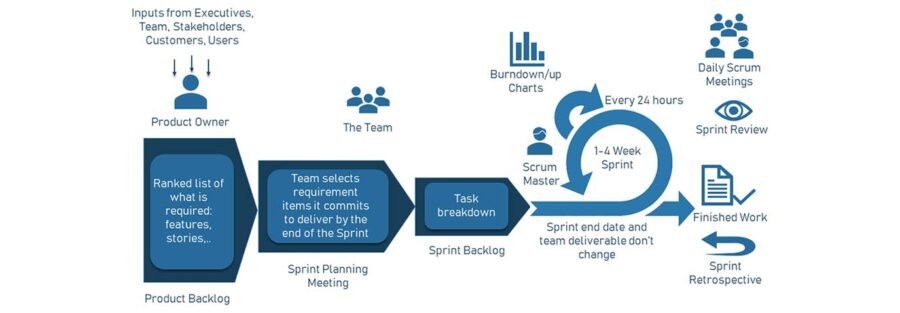AugmentMotive skills platform perspective for advantages of ‘Agile Project Management’ as a remote-based role, augmenting an engineering project management team.
Agile project management has gained significant usage over the years as an iterative and flexible approach. It involves breaking down complex projects into smaller, more manageable tasks and continuously iterating and adapting to changes. With the rise of remote work, the future of agile project management is looking brighter than ever. This blog will explore the advantages of agile project management as a remote-based role and how it can augment an engineering project management team.
Advantages of Agile Project Management as a Remote-Based Role
Improved Work-Life Balance
Remote work offers a better work-life balance, allowing employees to work from the comfort of their homes, avoid long commutes, and have more time for family and personal activities. This balance can help reduce stress levels, increase motivation, and improve productivity.
Access to Global Talent
Remote work opens up the possibility of working with talented individuals from all around the world without the constraints of geographical location. This can lead to more diverse teams, unique perspectives, and fresh ideas that can ultimately help drive innovation.
Increased Productivity
Remote work can increase productivity by eliminating distractions commonly found in the office environment. With the freedom to work in a more flexible environment, individuals can work at their own pace and schedule, leading to better focus, decision-making, and, ultimately, better results.
Reduced Costs
Remote work can significantly reduce overhead costs such as rent, utilities, and equipment. This can free up resources for other important business activities, such as investing in new technology or hiring more employees.
Augmenting an Engineering Project Management Team with Agile Project Management
Agile project management can augment an engineering project management team in several ways, including:
Improved Communication
Agile project management emphasizes communication, collaboration, and transparency. By implementing agile project management, engineering project management teams can communicate more effectively, share information, and make better-informed decisions.
Faster Time-to-Market
Agile project management can help engineering project management teams get products to market faster by breaking down complex projects into smaller, more manageable tasks and delivering incremental results. This approach can also help identify and address issues early in the project life cycle, reducing the likelihood of delays.
Increased Flexibility
Agile project management can help engineering project management teams be more flexible in responding to changing market demands, customer feedback, and other factors impacting the project. By continuously iterating and adapting to changes, engineering project management teams can be more responsive to the needs of their customers and deliver products that better meet their needs.
Improved Quality
Agile project management can improve product quality by allowing engineering teams to identify and address issues early in the project life cycle. By continuously testing and validating their work, engineering project management teams can ensure that the final product meets the highest quality standards.
Conclusion
In conclusion, the future of work is looking increasingly remote, and agile project management is poised to play an essential role in the success of engineering project management teams. With its emphasis on communication, collaboration, and transparency, agile project management can help teams work more effectively, deliver products faster, and ultimately improve the quality of their work. As remote work becomes more prevalent, agile project management is likely to become an increasingly valuable tool in the arsenal of engineering project management teams.

